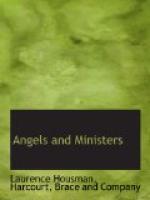(As he speaks, his head sinks in depression. There is a pause.)
TUMULTY (in his best sick-bed manner). Governor, don’t you think that you’d better rest now?
EX-PRES. (ignoring the remark). And so the old secret diplomacy, balancing for power, with war as the only sure end of it, came back to life; and I—pledged to its secrecies with the rest—I had to stay dumb. I was a drowning man, then, Tumulty—clutching at straws, till I became an adept at it. There, perhaps, as you say, I did do “wonders”—of a kind: all I could, anyway. That was my plight, while there in Paris we held high court, and banqueted, and drank healths from dead men’s skulls. Did nobody guess—outside—what was going on? I gave one signal that I thought was plain enough, when I sent for the George Washington to bring me home again. But, though I listened for it then, there seemed no response. People were so busy, you say, holding their breath; and that I couldn’t hear.
TUMULTY (zealous, in a pause, to show his interest). Well, Governor, well?
EX-PRES. And then, rather than let me so go and spoil the general effect (the one power still left to me!), they began to make concessions— concessions which, I see now, didn’t amount to much; and so they persuaded me, and I stayed on, and signed my failure with the rest.
TUMULTY (for a diversion pointing to the covered
cup).
Pardon me, Governor, you must obey orders, you know.
They are not mine.
EX-PRES. (taking up the cup with a dry smile). Executive authority has taught me that obeying orders is much simpler than giving them: you know when you’ve got them done. (Removing the cover, he drains the cup and sets it down again.) There! now let your conscience be at rest. (After a pause he resumes:) Tumulty, when I faced failure, when I knew that I had failed——Yes; don’t trouble to contradict me. I know, dear friend, I know that you don’t agree; and, God bless you! I also know why.——When I knew that, after the whole thing was over, and I was out again and free, do you suppose I wasn’t tempted to go out and cry the truth (as some were expecting and wishing for it to be cried) in the ears of the whole world?—let all know that I had failed, and so—that way at least—separate myself from the Evil Thing which there sat smiling at itself in its Hall of Mirrors—seeing no frustrate ghosts, no death’s heads at that feast, as I saw them?... I came out a haunted man—all the more because those I was amongst didn’t believe in ghosts—not then. People who have been overwhelmingly victorious in a great war find that difficult. But they will—some day.




